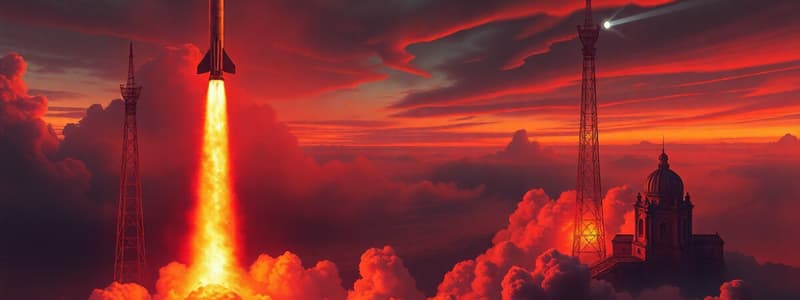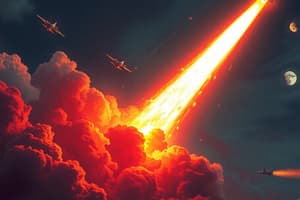Podcast
Questions and Answers
What was the significance of the Gulf of Tonkin incident for the US involvement in Vietnam?
What was the significance of the Gulf of Tonkin incident for the US involvement in Vietnam?
- It marked the beginning of direct military intervention. (correct)
- It resulted in immediate troop withdrawals.
- It caused a peace treaty to be signed.
- It led to the end of the Vietnam War.
The Tet Offensive was a surprise attack carried out on the Vietnamese New Year.
The Tet Offensive was a surprise attack carried out on the Vietnamese New Year.
True (A)
What was the My Lai Massacre?
What was the My Lai Massacre?
The killing of innocent civilians by US troops in the village of My Lai.
The strategy used by President Nixon involving a gradual withdrawal of American troops is known as __________.
The strategy used by President Nixon involving a gradual withdrawal of American troops is known as __________.
Match the following events with their corresponding outcomes:
Match the following events with their corresponding outcomes:
Who is recognized as the assassin of President John F. Kennedy?
Who is recognized as the assassin of President John F. Kennedy?
The Warren Commission concluded that multiple individuals were involved in JFK's assassination.
The Warren Commission concluded that multiple individuals were involved in JFK's assassination.
In which city was JFK assassinated?
In which city was JFK assassinated?
The only known recording of JFK's assassination is the __________.
The only known recording of JFK's assassination is the __________.
What event took place after JFK's assassination involving his assassin?
What event took place after JFK's assassination involving his assassin?
What was the primary purpose of the Bay of Pigs invasion?
What was the primary purpose of the Bay of Pigs invasion?
The Cuban Missile Crisis involved nuclear weapons being placed in Cuba by the United States.
The Cuban Missile Crisis involved nuclear weapons being placed in Cuba by the United States.
Who was the leader of North Vietnam known for using guerilla tactics?
Who was the leader of North Vietnam known for using guerilla tactics?
The _____ was built to prevent East Berliners from fleeing to the West.
The _____ was built to prevent East Berliners from fleeing to the West.
Match the following events with their descriptions:
Match the following events with their descriptions:
What was the outcome of the Gulf of Tonkin Incident?
What was the outcome of the Gulf of Tonkin Incident?
Ngo Dinh Diem's rule in South Vietnam ended with his assassination.
Ngo Dinh Diem's rule in South Vietnam ended with his assassination.
What was the main result of the Cuban Missile Crisis?
What was the main result of the Cuban Missile Crisis?
Fidel Castro was the Communist leader of Cuba during the _____ crisis.
Fidel Castro was the Communist leader of Cuba during the _____ crisis.
Which of the following was a consequence of the Berlin Blockade?
Which of the following was a consequence of the Berlin Blockade?
What was the primary goal of the Greensboro sit-in?
What was the primary goal of the Greensboro sit-in?
The Freedom Riders aimed to end segregation in interstate bus services.
The Freedom Riders aimed to end segregation in interstate bus services.
What are two important themes addressed by MLK in his Letter from Birmingham Jail?
What are two important themes addressed by MLK in his Letter from Birmingham Jail?
The ____________ was a movement aimed at registering African Americans in Mississippi to vote.
The ____________ was a movement aimed at registering African Americans in Mississippi to vote.
Match the following events with their significance:
Match the following events with their significance:
Who was the leader of the Nation of Islam?
Who was the leader of the Nation of Islam?
Malcolm X advocated for nonviolence and integration.
Malcolm X advocated for nonviolence and integration.
What event symbolized the struggle for voting rights in Alabama?
What event symbolized the struggle for voting rights in Alabama?
The ____________ was a significant civil rights protest that involved a large gathering at the Lincoln Memorial.
The ____________ was a significant civil rights protest that involved a large gathering at the Lincoln Memorial.
What does the Civil Rights Act of 1964 aim to achieve?
What does the Civil Rights Act of 1964 aim to achieve?
Flashcards
Cuban Missile Crisis
Cuban Missile Crisis
A 13-day confrontation between the US and the Soviet Union in 1962 over Soviet missiles in Cuba.
Fidel Castro
Fidel Castro
Communist leader of Cuba during the Cuban Missile Crisis.
U-2 Incident
U-2 Incident
A US spy plane was shot down over the Soviet Union in 1960.
Bay of Pigs Invasion
Bay of Pigs Invasion
Signup and view all the flashcards
Naval Blockade (Cuba)
Naval Blockade (Cuba)
Signup and view all the flashcards
Berlin Blockade
Berlin Blockade
Signup and view all the flashcards
Berlin Wall
Berlin Wall
Signup and view all the flashcards
Berlin Airlift
Berlin Airlift
Signup and view all the flashcards
Ho Chi Minh
Ho Chi Minh
Signup and view all the flashcards
Vietcong
Vietcong
Signup and view all the flashcards
Gulf of Tonkin Resolution
Gulf of Tonkin Resolution
Signup and view all the flashcards
Guerilla Tactics
Guerilla Tactics
Signup and view all the flashcards
Tet Offensive
Tet Offensive
Signup and view all the flashcards
My Lai Massacre
My Lai Massacre
Signup and view all the flashcards
Vietnamization
Vietnamization
Signup and view all the flashcards
Greensboro sit-in goal
Greensboro sit-in goal
Signup and view all the flashcards
Fall of Saigon
Fall of Saigon
Signup and view all the flashcards
Freedom Riders' mission
Freedom Riders' mission
Signup and view all the flashcards
JFK Assassination
JFK Assassination
Signup and view all the flashcards
MLK's Birmingham Jail Letter topics
MLK's Birmingham Jail Letter topics
Signup and view all the flashcards
Warren Commission
Warren Commission
Signup and view all the flashcards
March on Washington
March on Washington
Signup and view all the flashcards
Lee Harvey Oswald
Lee Harvey Oswald
Signup and view all the flashcards
KKK violence examples
KKK violence examples
Signup and view all the flashcards
One Bullet Theory
One Bullet Theory
Signup and view all the flashcards
Civil Rights Act impact
Civil Rights Act impact
Signup and view all the flashcards
Freedom Summer objective
Freedom Summer objective
Signup and view all the flashcards
Freedom Summer outcome
Freedom Summer outcome
Signup and view all the flashcards
Selma to Montgomery goal
Selma to Montgomery goal
Signup and view all the flashcards
Nation of Islam creator
Nation of Islam creator
Signup and view all the flashcards
Study Notes
1960's Study Guide
- Cuban Missile Crisis: Fidel Castro was the communist leader of Cuba during this crisis.
- U-2 Incident: A U-2 spy plane was shot down over the Soviet Union, leading to embarrassment for the US and a demand for apology.
- Bay of Pigs Invasion: A failed CIA attempt to invade Cuba, sending Cuban refugees to assassinate Fidel Castro.
- Naval Blockade: The goal of the naval blockade put on Cuba during the Cuban Missile Crisis was to prevent the Soviet Union from sending more weapons to Cuba.
- Primary Issue: The primary issue for the US during the Cuban Missile Crisis was the presence of nuclear weapons 90 miles from the US.
- Crisis Resolution: The Soviet Union removed missiles and weapons from Cuba, and the US promised not to invade Cuba and to remove missiles from Turkey and Italy.
- Berlin Blockade: The Berlin blockade blocked all entrances (roadways, canals, train tracks, etc.) to prevent people from moving from East to West Berlin.
- Berlin Wall: The Berlin Wall was constructed to prevent people from fleeing East Berlin to West Berlin.
Cold War Events
- Berlin Airlift: The delivery of food and supplies to West Berlin during the Berlin blockade.
- Ho Chi Minh: The North Vietnamese communist leader who used guerilla tactics and won independence from France.
- Ngo Dinh Diem: A corrupt South Vietnamese leader who persecuted Buddhists and was assassinated by the communist group, the Vietcong.
- Vietcong: A communist rebel group that attacked anti-communist forces and was supported by North Vietnam.
- US Goal in Vietnam: The US goal in Vietnam was to prevent the spread of communism.
- Gulf of Tonkin Incident: Allegedly a US ship was attacked by North Vietnam at the Gulf of Tonkin, giving the US a reason to get involved in the Vietnam War.
- Gulf of Tonkin Resolution: Gave President Johnson the power to prevent further aggression in Southeast Asia without formally declaring war.
- Guerrilla Tactics: Tactics involving hit and run attacks, traps, tunnels, and more were used during the Vietnam War.
- Tet Offensive: A surprise attack during the Vietnamese New Year, highlighting the difficulty the US faced in winning the war.
- My Lai Massacre: A brutal slaughter of innocent civilians by US troops and greatly influenced American opinion about the war.
- Vietnamization: President Nixon's strategy of slowly withdrawing troops and giving more responsibility to the South Vietnamese.
- Fall of Saigon: The event that marked the end of the Vietnam war and the spread of communism in Vietnam.
- JFK Assassination: JFK was assassinated in Dallas, Texas, and Lee Harvey Oswald was the known assassin.
- Warren Commission: The group that investigated the JFK assassination.
- Zapruder Film: The only known recording of the JFK assassination.
- One Bullet Theory: A theoretical explanation of the wounds sustained by JFK and others during the assassination.
- Greensboro Sit-in: A protest/sit-in at a segregated lunch counter to protest segregation.
- Freedom Riders: Civil rights activists riding buses across the South to challenge interstate bus segregation.
- Civil Disobedience/Birmingham Jail Letter: MLK's letter explaining the importance of civil disobedience and his beliefs about unjust laws.
- March on Washington: A large protest rally seeking civil rights and the passage of the Civil Rights Act
- Civil Rights Act: Ended discrimination, segregation, and anything preventing the right to vote.
- Voting Rights Act of 1965: Helped to register black voters; it was highly successful.
- Bloody Sunday: A march from Selma to Montgomery that was met with police violence.
- Nation of Islam: A religious movement led by Elijah Muhammad.
- Malcolm X: A prominent leader of the Nation of Islam with differing views than MLK; who was assassinated.
- Long Hot Summer of 1967: Violent race riots across the US occured.
- Cuban Missile Crisis Leader: Nikita Khrushchev was the Soviet Union's leader during the Crisis.
- JFK Burial: Arlington National Cemetery.
- Presidential Security: Increased security measures for presidents after JFK's assassination, including armored vehicles.
- Cold War Peak: The Cuban Missile Crisis is considered the peak of the Cold War.
Studying That Suits You
Use AI to generate personalized quizzes and flashcards to suit your learning preferences.




